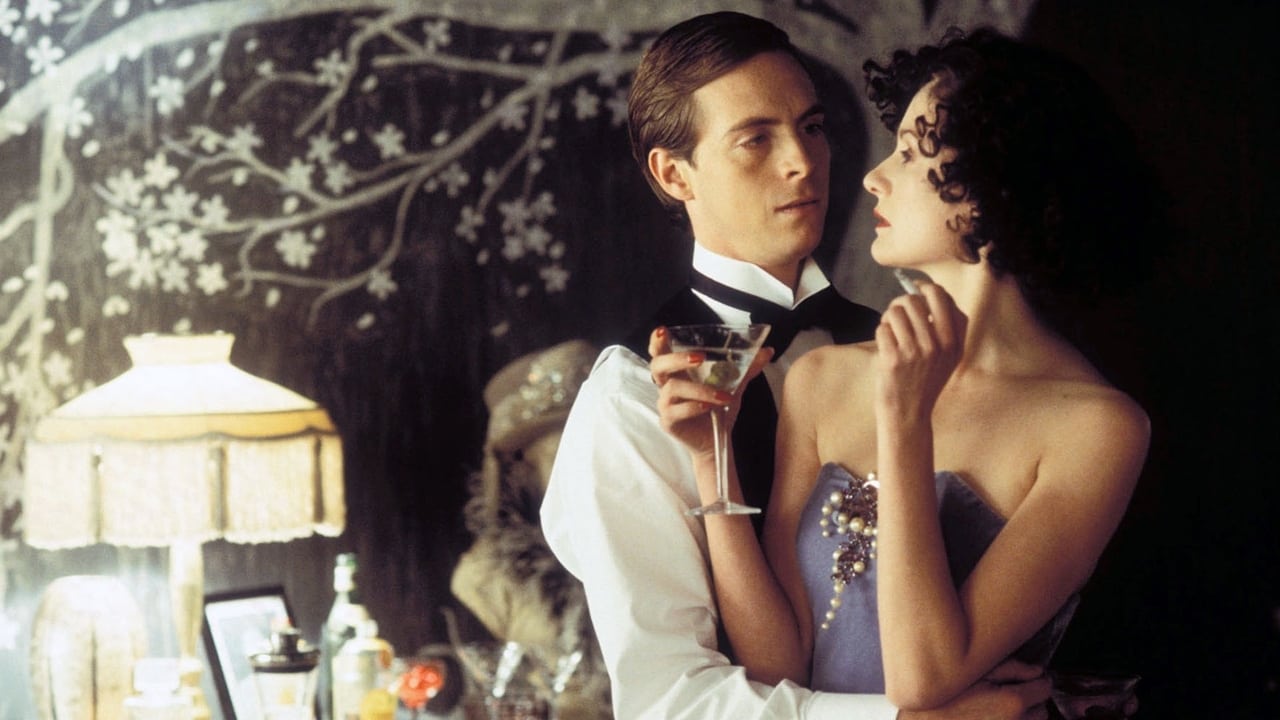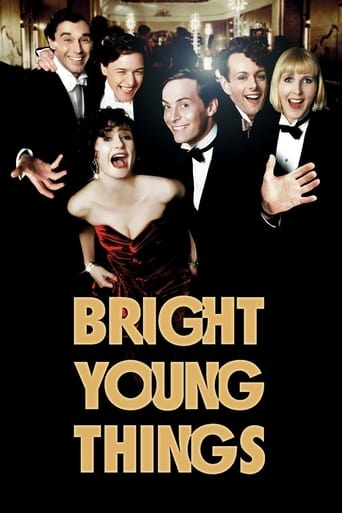

Situated between the two world wars, tells the story of a rowdy group of Bohemians by nature that consist of poets, musicians or actors or just bored from the upper class echelon, fulfill in their wasted lives by partying, drinking, or other assorted ways to keep themselves entertained in order to search for the meaning of life. "Bright Young Things" depicts the ideology of what went through the minds of young people who grew up in the 1930's that included household names at the time like Ernest Hemingway and Gertrude Stein and Oscar Wilde. These people were well cultured and extraordinary geniuses, but due to their controversial ways, their fate ended in tragic proportions.Based on the novel "Vile Bodies" by Evelyn Waugh, actor/director Stephen Fry resurrects this rather untouched decade with a no-nonsense, relaxed manner as we explore these posh upper-class socialites we like to call "Bright Young Things". With a fast-paced and refined, the characters portrayed here are spineless and degenerative. With disaster drawing upon them, the London Tabloids are chewing up on their reputation. They even usurp the Royal Family in media attention. These guys don't care about current political events, money to them grows on trees and they lived their lives like it was the last day on Earth for them, which might not be too far away for them. But do you think they care?Stephen Fry has wowed his fans with his impressive resume of outstanding performances over the years. Even though he's acting here albeit a small role, his directing is another reason to respect this man. The cast that's compiled here are a definitive ensemble of well-known performers juxtaposed with a cast of then newcomers. We have veteran performers like Jim Broadbent, Julia Mackenzie and Peter O'Toole and final goodbye for Lord John Mills. Then there's relative newbies at the time like Emily Mortimer, Stephen Campbell Moore and James McAvoy enlightening us with their professional prowess. And then also we have North American alums to join the cast (Dan Aykroyd and Stockard Channing) show that they can turn in brilliant performances without sounding clichéd. Fry loosely lets them strut their acting chops until some of them fizzle out in their own demise. And though the movie "Chicago" paints the grim depiction of the roaring twenties, "Bright Young Things" goes the extra mile to in all its reckless ways. With incredible settings, accurate costuming and luscious scenery, this movie captivates a prelude time period before WWII. I highly recommend you to watch this movie. You'll be enlightened, by the superb acting, the authentic costumes and Stephen Fry's masterful direction. It will leave you mesmerized.
... View MoreI saw this movie because I'm a fan of Stephen Fry from back in his "Blackadder" days, and I was reading an article about James McAvoy which mentioned his doing this film with Fry. I have to say that even though the film didn't make me think any less of either man as an artist, it was somewhat underwhelming overall, particularly in the last 20 minutes or so. I was very amused by the "Old Major" character for most of the film but finding him in the war situation didn't resonate for me. The biggest problem I had was with Nina Blount (Emily Mortimer). I couldn't be sure if I was supposed to respect that character or not, and by the time the film seemed to come down one way I had already made up my mind for the opposite. When Adam (Stephen Campbell Moore) sold her for his rent money, I thought it was actually a pretty sensible move considering how shallow she is, and I didn't understand or believe that he would give up his fortune for her much less burn his book for no real reason. In general I didn't think the film earned the kind of sincerity and pathos that the director Fry attempts to draw on for that finale (and I wasn't surprised, after writing this and reading some other comments, to find it was imported into the book).However, the more breezy aspects of the movie do work, and I also enjoyed the parts with McAvoy toward the beginning. His performance is really thrilling the way he makes you feel at the same time how pathetically limited his ambitions are and yet believe his sincerity when he announces that he'll kill himself if he's not invited to a particular soirée. I laughed at the scene with him and Richard E. Grant (as a religious figure) and I felt bad for him when he made good on his promise. If only the movie had been about his character instead of this other guy who felt too serious to fit into that social group. There's a dual aspect to his screen persona, a mixture of a kind of misguided or disproportionate hunger for excitement and a vulnerability to intimate personal relationships that produces a feeling of awkward sensitivity just beneath the surface of a boor.Fenella Woolgar is an actress I'd not heard of, but her work in this film was the most impressive of all. I've actually known people a bit like her back in college. I recognized pretty much all of the basic types presented in the film, but she made hers feel the most human and real which is an accomplishment considering the characters are deliberately shallow. What happens to her happy-go-lucky character made me reflect on the fact that she could have been somewhat insane all along and nobody would've noticed. Without getting too personal this also reminds me of some people I've known and some times I've lived in. Sometimes with the irrational things we do as kids or young adults either on a spur of the moment impulse or to try to impress each other, we get so wound up and confused that we can't even recognize who among our loved friends is just wild and crazy with youth and who might be alcoholic or mentally sick until it's too late. At least I never could.The leading man and lady aren't nearly as impressive. Moore does pretty well at least until those war scenes, but I never cared for the character Mortimer was playing so it's hard to say how good she was in the movie. I never felt any kind of humanity from her, and I think the writer/director wanted us to, so at least some of the blame falls on her shoulders. Dan Akyroid is suitable, nothing special, and O'Toole's brief appearance grabs our attention but does nothing with it.All in all, it's a moderately successful and watchable film, but I don't plan on returning to it anytime soon. I think the film takes itself a bit more seriously than it should.
... View MoreI saw Bright Young Things tonight. Sorry. But it had to be done.Since I expected it to be awful, it didn't seem so bad. It's certainly a very pretty film. The main character I suppose is intended to be Evelyn Waugh. And he does a good job, and a bad one. Sometimes he behaves and talks just like you would think Waugh would have. At other times he's a million miles off. And the same with the plot lines. Some remind you of Saki, but others of Spielberg. I laughed out loud at times, and cringed at others. The ending is more shamelessly syrupy than anything even Spielberg would dare. Almost Bollywood. Waugh would have hated it.I think this is a confused effort. Stephen Fry didn't know if he wanted to do Pinewood or Hollywood. So he did them both. Unfortunately it's an uneven mix that falls apart at the end.
... View MoreThe best thing about Bright Young Things is the brilliant and fun atmosphere that's created. Writer/ Director Stephen Fry has established himself as a brilliant talent. His camera work and acting direction sets a perfect stage to seeing London in the 30's.The movie is adapted from the novel "Viles Bodies" that tells the story of a writer who reports the celebrity gossip to the local newspaper. The movie is filled with sex, scandal, and celebrity. The film brings London to life and makes you wish you were a part of this elite circle even from the opening credits. Unlike many movies, this movie's flaws will start you in the face while you watch them. The story doesn't fit together perfectly, which is usually the case when adapting classic literature. But in the end, I'm not sure you'll mind it. It's too gitty to focus on things like that.The film has two unforgettable attributes which I won't go into depth about or spoil. Just look for Stockard Channing.
... View More